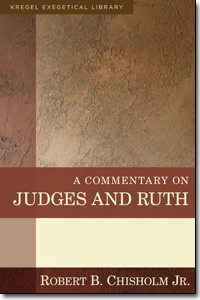Review of Robert B. Chisholm, A Commentary on Judges and Ruth, Grand Rapids: Kregel Academic, 2013, 697 pp., $39.99. In the past Judges and Ruth have not been particularly well served by commentators (Leon Wood’s Distressing Days of the Judges being one notable exception). Many studies in the past were more homiletical than analytical. The Book of Judges presents some unique problems for the Bible interpreter. Such issues as the date of certain judges, the extent of their careers and …
Category: Book Reviews
I really appreciate John Byl’s stand for young-earth creationism against all the accommodationist nonsense of old-earthers. He has written some thoughts about apologist Douglas Groothuis’s big book Christian Apologetics which should be pondered. I think he shows the problems which inhere in the ‘two books’ view and in cow-towing to Big Bang cosmology. http://bylogos.blogspot.com/2014/03/a-defective-case-for-biblical-faith.html#more I agree with Byl that Groothuis’s book has good things in it, although I cannot recommend it as an apologetics book. I feel okay about it …
Review of Covenantal Apologetics: Principles & Practices in Defense of Our Faith, by K. Scott Oliphint, Wheaton: Crossway, 2013, 277 pages, pbk. K. Scott Oliphint is Professor of Systematic Theology and Apologetics at Westminster Theological Seminary in Philadelphia. He has written several good books of apologetics and philosophical theology; most notably his Reasons for Faith and God with Us. He is, as far as my opinion counts, the main successor to Van Til and Bahnsen and their apologetic approach. This …
Fred Butler’s Hip n Thigh Blog is one of the best all round blogs out there. Here are his thoughts on his reading over 2013: http://hipandthigh.wordpress.com/2013/12/26/books-i-heard-or-read-in-2013/ My time has been gobbled up over the past weeks, but I hope to resume regular posting soon. Have a great New Year everyone! Paul H. …
Darwin’s Doubt: The Explosive Origin of Animal Life and the Case for Intelligent Design, by Stephen C. Meyer, New York: Harper Collins, 2013, xii + 498 pages, hdbk. Stephen Meyer has been a thorn in the side of dogmatic evolutionists for a good while now. He has worked as a geophysicist and has a PhD in the Philosophy of Science from Cambridge. His previous book of nearly 600 pages, Signature in the Cell, dealt with the criteria for determining information, …
I have reviewed William Edgar’s recent spiritual biography of Francis Schaeffer. It is well worth your hard-earned money. Here’s the link: http://www.telosministries.com/review-of-schaeffer-on-the-christian-life-by-william-edgar/ …
Part One G. There are some noteworthy discussions of passages in the book. Probably the most intriguing part of Gentry’s contribution is his promotion of a pre-fall “Creation covenant.” Gentry’s exposition of this covenant is found in Chapters 5 and 6. While pursuing an exchange with Paul Williamson, Gentry traces out the difference between the phrase “to cut a covenant” (karat berith), and “to uphold an existing covenant” (heqim berith). And he makes a reasonable circumstantial case for tying …
Review of Kingdom through Covenant: A Biblical-Theological Understanding of the Covenants, by Peter J. Gentry and Stephen J. Wellum, Wheaton, Illinois: Crossway, 2012, 848 pages. A. This book is written by two professors from Southern Seminary; one a theologian, the other an Old Testament scholar. The work in question is a courageous effort to forge a via media between traditional covenant theology (CT) and dispensational theology (DT). If for no other reason than this, Kingdom through Covenant deserves attention, and …
I wrote a review at the TELOS site of a very good book by Louis Markos which examines Tolkien’s and Lewis’s illustrating of Virtue in their writings: http://www.telosministries.com/tolkien-and-lewis-on-virtue-on-the-shoulders-of-hobbits/ …
A Review of Augustine: A New Biography, by James J. O’Donnell, New York: HarperCollins, 2006, paperback, 396 + 15. This review is written to help those wanting to read a good book on Augustine who might be fooled by this bad one. The book has been on the market for 7 years, but since I endured reading it, I felt I should record my opinion of it here. Augustine is not one of my favorite theologians. Yes, he was brilliant …



